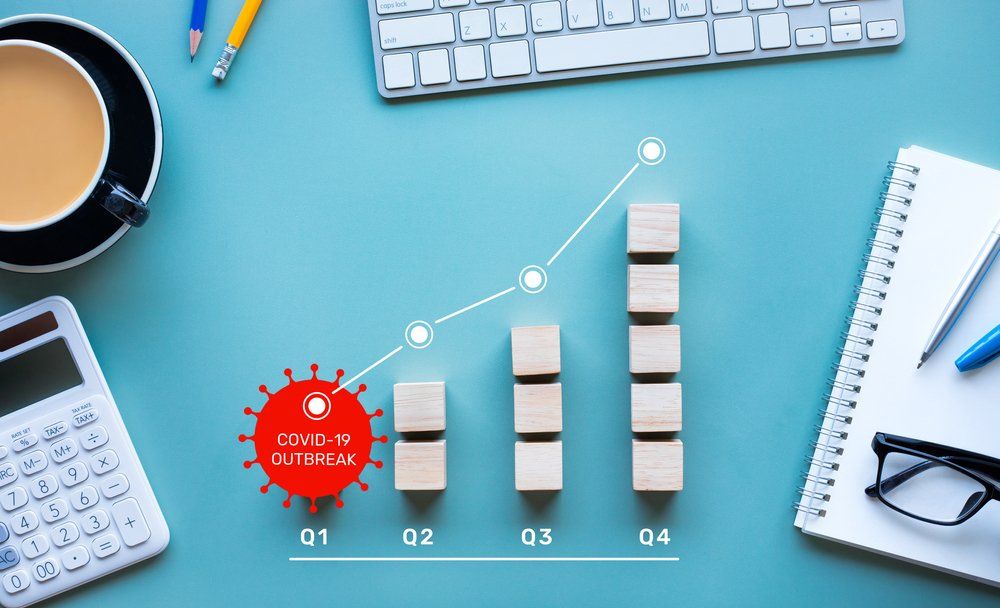JFCC BLOG

Since arriving in the United States in early 2020, COVID-19 has impacted nearly every aspect of our lives. We’ve gone from lockdowns to re-openings and back again. For business owners, this is a time of extreme uncertainty with operational risks and opportunities. With so much ambiguity, how can one understand where their business stands and what move to make next?

To many people, “divorce” conjures nightmares of exorbitant legal fees, courtroom visits and intense disputes among the separating partners. But what if there was a better way? Divorce mediation is a less-costly alternative for couples willing to work together and enter a compromise outside of court. Read on to learn more about how divorce mediation works and if it might be a viable option for you. What is Divorce Mediation? Divorce mediation is the process of working with a neutral, third-party mediator to negotiate the terms of ending your marriage. Commonly covered areas of interest include property division, child custody and visitation, child support and alimony or spousal support. Typically, divorcees go through five to seven meetings with a mediator, depending on the complexity of the case. These include introductory meetings explaining the process, detailed meetings to work through custody and finances, and finally, a meeting where a tentative settlement is drafted and reviewed by the separating partners. The Benefits of Divorce Mediation Avoid the Courts (And Public Record) By choosing divorce mediation, you and your spouse can avoid the high costs of paying for separate legal teams, the inconvenience of court appearances, and the exposure of those court appearances being entered into public court record. Partners Decide the Outcome In court-led divorce proceedings, spouses are represented by separate legal teams who each make their case to a judge, or divorce master, and hope the judge sees things their way. Once a judgment is made and entered into the court record, there is no easy way to take a step back or continue negotiations with your former spouse. It is possible that no one ends up happy as a result. On the other hand, while divorce mediation can take considerable communication and negotiation, the process should conclude with both parties feeling in control of the outcome. The mediator cannot force either party to accept the terms of an agreement. Speed and Cost Savings Depending on many factors at play, such as the size of the marital estate and if children are involved, the average divorce through the Pennsylvania court system typically takes around two years. Divorce mediation is often a much faster process. At Jordan Financial Consulting and Coaching, we have found the average mediation process takes between 3-6 months, based on the time it takes to gather financial and estate documents, receive appraisals on property and work through child custody plans. Will Mediation Work for Me? Several key factors will determine if divorce mediation is the best direction for you and your spouse. You are Separating on Good Terms Contrary to what we see so often in the media, many marriages end not with a bang, but with a whisper. Most times, divorces are years in the making as partners grow apart and realize staying together is not the best choice for either party. In these cases, a mediator may be the least painful and quickest way to a resolution. You Are Willing to Negotiate and Communicate It is critically important for both spouses to be willing to meet at the negotiating table and be flexible in their demands. Oftentimes, lack of communication skills trigger incidents that cause many couples to fall apart. The mediation process can help mend some of those tears and help couples learn to communicate once again. This benefit is felt most strongly by couples who will have shared custody of children. Taking the Next Step Jordan Financial’s professional mediation services can help you and your spouse reach a mutual agreement. When we serve as your mediator, your final product will be a jointly negotiated Memorandum of Understanding. We can save you time and the costly fees of a prolonged court battle. Contact us today for a free phone consultation to learn how our divorce mediation services can help you.

This month, PowerLink worked with more than 185 small business owners who attended one of our 14 Community Advisory Boards, Custom Advisory Boards or Private one-on-one mentoring sessions over Zoom. The topic was one that everyone has been dealing with: hiring in the face of expansion, contraction, pivot. We welcomed a guest adviser with expertise in Human Resources to help address questions like the following: 1. “I have to hire another person to help me. Should I hire a “Mini-Me” or should I hire someone with skills that I don’t have?” Most owners wanted someone who had skills they didn’t have. We talked through what it takes to hire, train and manage someone who is different than you. 2. “How do I convince employees I laid off to come back for the same wage when they get an extra $300 per month to stay home?” Note that for full time, that is about $3/hour in extra pay and that it ends on October 1st. We talked through PA law on worker’s refusing work when an employer calls them back and how to document it for unemployment wages after a refusal. 3. “How do I get someone to actually do what I hired them to do?” PowerLink programs stick to the “Traction” methodology which reinforces “Accountability” over job tasks and developing scorecards that employees have to maintain and report back to owners regarding individual performance. 4. “How do I hire, onboard and train someone to do a job that I am terrible at?” The key is hiring someone who has similar values to you. That means asking the right questions in an interview. Coaching is available through our PowerLink Human Resource connection. Our next two meetings are June 10 and July 8. We are sponsored by the Harrisburg Regional Chamber & CREDC as well as First National Bank. We meet via Zoom from 8:00 AM – 9:30 AM the second Tuesday of every month. Please message me if you’d like to join as my guest to see what we’re all about.

Planning for retirement can feel overwhelming and complicated. This is especially true for small business owners who may not have their nest egg saved in a retirement savings plan such as a 401(k). As a business owner, you know the ins and outs of your monthly revenue and expenses, but do you know what your business as an asset is worth? Many owners overestimate the value of their companies, potentially setting themselves up for disappointment when it is time to move on. Understanding the value of your business is an important step to plan for your retirement, whether that includes the sale of the business or passing a family business on to the next generation. Types of Valuations Every business valuation is unique. A valuation expert can help you identify the best way to value your company depending on the size of the business, industry and purpose of the valuation. Asset-Based Approach An asset-based approach is one of the most popular and universally accepted ways to value a company. This approach values a company by subtracting its total liabilities from its total assets. These liabilities and assets can be tangible (like inventory, equipment and buildings) and intangible (like reputation and intellectual property). The asset-based valuation technique does not consider a business’ future earnings potential; rather, it considers only the company as it is today. Income-Based Approach In stark contrast to the asset-based approach, the income-based approach analyzes future earnings to value a business. This commonly involves reviewing historical earnings, projections of future earnings, discretionary and unusual expenses, and risks. Market-Based Approach The market-based approach works just like it sounds – a business valuation expert reviews the market to find similar, perhaps recently sold businesses and then uses those findings as benchmarks to value a business. This approach is most useful when many similar businesses in the same region have been sold or quoted for sale. When to Get Started It is highly recommended to complete a business valuation on your company regularly to understand how market fluctuations are affecting your business’ value and to gain an accurate perception of its value. It is critical to give yourself a long runway when it comes to business transitions and retirement planning. Best practice is to consult a business valuation expert no later than three years before a planned transition. This will allow time for you to maximize your business value after your initial valuation. How to Select a Valuation Expert There is no shortage of “experts” offering business valuation services. Many websites offer quick, easy and inexpensive valuations, but this cookie-cutter approach lacks the nuance that a qualified, experienced professional provides. When searching for a valuation partner, two main considerations should be experience and credentials. While there are a number of credentials related to business valuations, the Certified Valuation Analyst (CVA) designation is the most widely recognized credential and the only credential accredited by the National Commission for Certifying Agencies® (NCCA®) and the American National Standards Institute® (ANSI®). Sherry Jordan, CEO and founder of Jordan Financial Consulting and Coaching, has more than 20 years of experience in public accounting including business valuation, litigation support, financial forensics and divorce mediation. She is a Certified Valuation Analyst (CVA) with experience conducting valuations for businesses large and small. Contact us to learn more about our business valuation services.

For many divorcing couples, the process is daunting, difficult and emotionally tumultuous. While some marriages end amicably, others end in courtrooms with legal experts battling for their client’s positions. During this time, finances are an especially sensitive and central subject. In some situations, a legal team may not be enough to protect you and get your fair share of marital assets. In those cases, a financial forensic evaluation is key. The Power of a Forensic Evaluation Accountants use forensic evaluations to uncover financial information that you may not be aware of about your spouse. You can think of these accountants as financial detectives. They use both personal and business documents such as tax filings, bank statements, property deeds and investment statements to paint a complete picture of your marital financial assets and liabilities (what you own, and what you owe). In addition to digging through financial documents, forensic accountants can serve as expert witnesses in court on your behalf. In the midst of a challenging divorce, it is tempting to rush through the process to get it over with, but this could negatively impact you and your family’s long-term financial future. Having the full financial picture is critical, as the information is used to determine spousal support, child support, the division of property, including financial assets, and more. Unless a prenuptial agreement determines otherwise, financial assets received over the course of a marriage are considered marital property that will be split equitably in Pennsylvania between the spouses upon a divorce. It is important to be aware that “equitable” does not mean “equal” and the division of property may or may not be negotiated 50/50. When is a Forensic Evaluation Needed? There are several situations where a forensic evaluation can safeguard your financial future during a divorce. Your Spouse Handled the Finances In many marriages, one spouse pays the bills, files the taxes and handles the finances in general. If you have never actively monitored your marital finances, it may be a worthwhile endeavor to bring in a forensic expert to give you peace of mind as to the validity of the documents that you are now reviewing in divorce. You Believe Your Spouse Has Hidden Assets In the digital age, it’s easier than ever to move money quickly and quietly. Having a portion of a paycheck diverted into an individual account, creating off-shore accounts or transferring assets to shell corporations can easily be done with a few clicks of a mouse. Additionally, when one spouse owns a business, it is important to note that business owners have ample opportunity to hide assets by padding payroll, paying friends as employees, creating fake business debt, or simply not reporting all of their cash transactions. You are Involved in a High-Asset Divorce In most high-asset divorces, developing a full financial picture is no simple task. There are likely many investment and bank accounts, multiple properties to evaluate and potentially business interests to consider. In such situations, even in an amicable divorce, it is important to have a forensic evaluator support your case in court to ensure you receive your fair share. The Divorce is Messy We’ve all heard horror stories of divorces that turn former lovers into bitter foes. It’s certainly true that divorce and deeply hurt feelings can bring out the worst in someone. If you find yourself in this situation, it’s important to have a financial expert to verify the data as your attorney goes to bat for you to protect your interests. Who Makes a Good Forensic Accountant? When working with your legal team to find a forensic accountant, there are a few key qualifications to keep in mind. These include, but certainly aren’t limited to, being a Certified Public Accountant (CPA), Certified Valuation Analyst (CVA), Certified in Financial Forensics (CFF), previous experience in litigation support, service as an expert witness, and experience in business valuation. When considering a forensic accountant, ask for recent success stories for situations similar to yours. Sherry Jordan, CEO and founder of Jordan Financial Consulting and Coaching, has more than 20 years of experience in public accounting including business valuation, litigation support, financial forensics, divorce mediation and business valuation. Contact us today to learn more about our forensic evaluation services and how our team can support you during your divorce.
A recent LinkedIn article asks an important question: When will the economy recover? LinkedIn has developed a US Recovery Tracker with key metrics regarding COVID-19 and its impact on hiring, revenue growth, and employer confidence. Small businesses: your challenge right now is to balance your optimism -- critical for entrepreneurial growth and sustainability -- with a fair amount of conservatism. This may feel unnatural for you. How does an entrepreneur, a risk-taker spirit, behave in a conservative way? Are you reserving cash? Are you evaluating all cash flow support available to you - not just the PPP, but interest-only loan payments and short-term loan forbearance? Are you re-evaluating investment opportunities with real-time, fluid metrics? Most economic studies I have seen to date anticipate economic recovery will stretch into 2022. Are you prepared? Contact Jordan Financial Consulting & Coaching for assistance with your COVID-19 survival planning - individual and group coaching options are available. #cashflow #pivot #forecast #growth

COVID-19 Relief Are you a small business in need of capital to retain employees on your payroll? The Paycheck Protection Program (PPP) may help. The program would provide cash-flow assistance through 100 percent federally guaranteed loans to employers who maintain their payroll during this emergency. PPP has a host of attractive features, such as forgiveness of up to 8 weeks of payroll based on employee retention and salary levels, no SBA fees, and at least six months of deferral with maximum deferrals of up to a year. This program would be retroactive to February 15, 2020...Loans are available through June 30, 2020.
Sherry Jordan • March 2, 2021
The COVID-19 pandemic has drastically changed our lives and, for some, our tax situations. For many Americans, filing taxes is a daunting and complex task, even in the best of times. Due to changes brought on by the pandemic, there may be even more questions than usual swirling in the minds of tax filers.
Here we break down how changes caused by the COVID-19 pandemic may affect your personal taxes.
COVID-19 Stimulus Checks
Since the pandemic began in March of 2020, many Americans have received two rounds of Economic Impact Payments, more commonly referred to as stimulus checks. These direct payments came to taxpayers first from the CARES Act in the summer of 2020 and later from the Coronavirus Response and Relief Supplemental Appropriations Act of 2021. The eligibility for these programs depended on your 2018 or 2019 tax filing.
The Economic Impact Payments are considered refundable tax credits above and beyond a filer’s anticipated refund or tax due for the 2020 tax year. To state it simply, this means that the stimulus checks received, based on your personal eligibility, will not affect your refund or tax bill in 2020.
Recovery Rebate Credit
Most eligible filers received their payments automatically from the IRS by direct deposit or a mailed check. However, if you didn’t receive the full amount of the payments, you may be eligible to claim a Recovery Rebate Credit on your 2020 taxes.
As stated on IRS.gov, “Economic Impact Payments were based on your 2018 or 2019 tax year information. The Recovery Rebate Credit is similar except that the eligibility and the amount are based on 2020 information that you include on your 2020 tax return.”
This Recovery Rebate Credit is especially valuable for filers whose financial situations may have changed from their 2018 or 2019 filings. Eligible filers will receive this money in the form of a smaller tax bill or a bigger refund.
Early Withdrawals from Retirement Accounts
The CARES Act gave Americans additional flexibility to access money saved in retirement accounts. Typically, withdrawals from traditional Individual Retirement Accounts (IRA) and employer-provided accounts come with a 10% withdrawal penalty for anyone under 59 ½ years old. The CARES Act temporarily eliminated this penalty and gives Americans the opportunity to pay this money back into their retirement accounts if they are financially able to do so.
It is important to note that one third of the money withdrawn will be considered income on your tax filing over a period of three years. For example, if you withdrew $9,000, $3,000 will be added to your income for 2020, 2021 and 2022. Alternatively, filers have the opportunity to claim the full income in the year of the withdrawal, which may be advantageous for some.
Taxpayers will report these distributions on Form 8915-E, which was recently released from the IRS for federal filing and most state filings, including Pennsylvania.
Required Minimum Distribution (RMD) Waivers
The CARES Act also allowed Americans to forego their annual Required Minimum Distribution (RMD) or return the distribution if it was withdrawn before the passage of the CARES Act.
Required Minimum Distributions (RMD) are the minimum amount that must be withdrawn from retirement accounts annually by Americans over age 70 ½ (if your 70th birthday was before July 1, 2019) or 72 (70th birthday is July 1, 2019 or later).
Unemployment
In 2020, a record-breaking number of Americans filed for unemployment. If you collected unemployment, you may be wondering what effect this will have on your taxes.
Unlike the economic recovery payments, unemployment benefits are taxed by the federal government, including the additional $600 per week some received under the CARES Act. Luckily for Pennsylvanians, in Pennsylvania, unemployment benefits are not taxed at the state or local level. In fact, Pennsylvania allows individuals who receive unemployment to choose to have 10% of their benefits withheld for federal income taxes. (Those receiving unemployment can change their withholding online, if they wish).
If you did not have federal taxes withheld from your unemployment benefits, you may receive a larger-than-expected bill come filing time. If you can’t pay your taxes on time, it’s still important to file by the tax deadline of April 15, 2021 and pay as much as you can. While you will need to pay interest on past-due payments, the IRS is willing to work with taxpayers to discuss payment options.
The Time to File is Now
The IRS urges Americans to file their taxes early and electronically to expedite the process. To receive refunds quickly, the IRS is encouraging taxpayers to use direct deposit.
This year’s tax filing deadline is April 15, 2021.
Need professional help? Contact us today.




